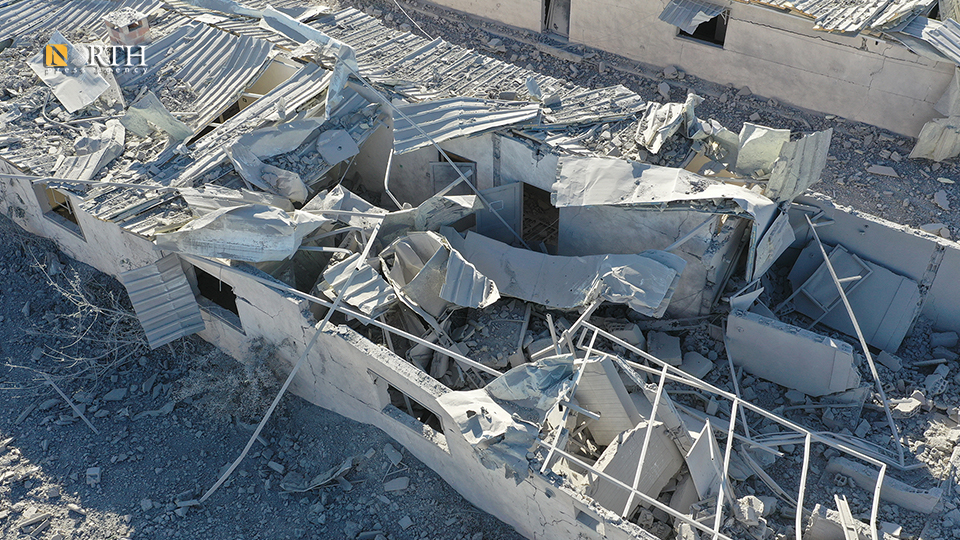By Robin Omar
QAMISHLI, Syria (North Press) – Turkey’s targeting of vital infrastructure and its consequent power outages and severe fuel shortage, impacted the healthcare sector, leading most organizations supporting the healthcare sector to suspend their operations.
Dr. Mahmoud Abdullah, Deputy co-chair of the Health Board of the Autonomous Administration of North and East Syria (AANES), said, the Turkey’s recent attacks “fall in the dark history of humanity.” These attacks have caused significant damage to the entire infrastructure in densely populated areas with innocent civilians, exacerbating the humanitarian crisis and affecting the entire population.
Since Oct. 5, Turkey has launched a series of airstrikes on areas stretching from the city of Derik in the far northeast of Syria all the way to Qamishli, Hasakah, Kobani, and the northern countryside of Aleppo. The attacks effectively put gas plants and power facilities completely out of service as Turkey considered them “legitimate targets.”
Abdullah added that displacement has increased as a result of the power outage and the severe shortage of fuel. Most organizations supporting the healthcare sector have suspended their operations, negatively impacting the medical sectors’ ability to serve the population, particularly after receiving large numbers of wounded, including women and children.

The Covid-19 Hospital in Derik was completely destroyed. This hospital consisted of four sections, two designated for Covid patients, and two for suspected Covid patients, with a total of 12 rooms, each accommodating four patients until undergoing PCR testing.
All of the emergency and treatment medications for patients and medical equipment were destroyed, including monitors, nebulizers, ventilators, blood pressure monitors, oximeter devices, and mobile X-ray machines.
The hospital was entirely destroyed and became a pile of rubble.
Real Catastrophe
“We cannot simply give a percentage for the extent of the damage caused to the healthcare sector, but observers of the humanitarian situation in northeastern Syria realize that any attack on the infrastructure warns of a humanitarian catastrophe on all levels, mainly on providing the most basic medical services,” according to the Abdullah.
He further stated that medical services were exponentially affected with the escalation of the attacks. ” We were already under a complete embargo. We secured equipment for the medical service, including medications, with the most difficult ways, which cost the AANES significant amounts of money. It’s worth mentioning that all non-governmental humanitarian organizations have suspended most of their operations due to the blatant aggression. All these factors exacerbated the situation, making the provision of medical services extremely difficult,” according to the official.
He added their staffs provide all available medical services, the medical staff continues to provide all available services. “We cannot guarantee the duration of the continuation of this service due to the repercussions of the Turkish aggression on the infrastructure, which threatens a real catastrophe,” he said adding that “The entire world should assume their responsibility and support these sectors to restore them back into operation, and to halt the Turkish aggression.”
The Article 3 common to the four Geneva Conventions of 1949 stipulates all parties to non-international armed conflict in Syria to collect the wounded and sick and care for them. The customary international humanitarian law also provides special protection for hospitals, medical staffs, and healthcare workers.
The international human rights law prohibits arbitrary deprivation of freedom. The right to health, enshrined in the International Covenant on economic, social, and cultural rights, to which Syria is a party, includes an unequivocal commitment to provide healthcare facilities and access to healthcare services on a non-discriminatory basis, especially for vulnerable and marginalized groups, as stated in Article No. 14. Deliberate attacks on hospitals and places housing the wounded and sick and attacks on healthcare staffs using slogans of the Red Cross or Red Crescent constitute “a war crime in non-international armed conflicts.”
Exposing patients and healthcare workers to danger and threatening the humanitarian function in healthcare facilities ultimately has a serious impact on compliance with Article 3 that states to provide care to the wounded and sick. In addition, “failing to respect the slogan under the Geneva Conventions undermines its protective purpose,” according to Abdullah.
Crime is proved
Jwan Isso, a lawyer and member of the Sere Kaniye Displaced People Committee, said, “Turkey’s actions, behaviors, or crimes violate the rules of the four Geneva Conventions, including the Fourth Convention, which explicitly stipulates the protection of civilians and civilian facilities. Even in the international humanitarian law and according to its main articles, when a state enters another state’s territory, it must protect the indigenous population, not target facilities and vital installations that serve the people to maintain their survival in order to continue living in their areas or cities and villages. Turkey, however, violates all these standards.”
He pointed out that the Turkish state violates all these laws, conventions, and agreements including the four Geneva Conventions as well as the two attached protocols, No.1 and No.2 of 1977. Therefore, “the crime is proved.” Isso said, “The Turkish state is a part of some of these international agreements, including the Civil and Political Covenant and the Covenant on Civil and Political Rights, which stipulates the need to protect civilians and ensure political and civil rights of indigenous populations, as well as many other agreements, including collective and bilateral agreements. Therefore, the Turkish state committed these crimes on the ground. The crime is proved, the situation still remains, and the victims are present. We know that Turkey’s main objective in these direct attacks, occupation, and targeting of facilities is primarily to displace the indigenous population and then expand and occupy more Syrian territories.”

